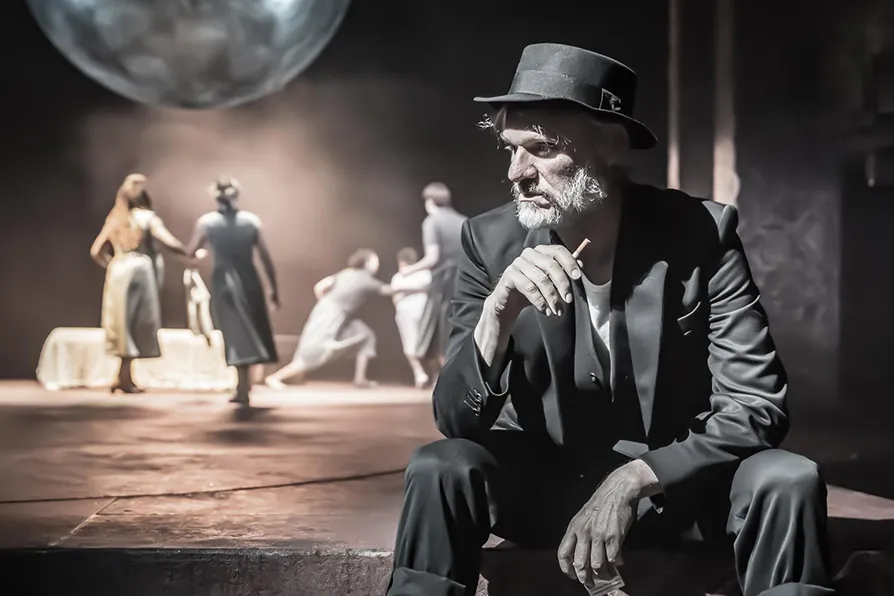TONY BURKE speaks to Gambian kora player SUNTOU SUSSO
GORDON PARSONS advises you to get up to speed on obscure ancient ceremonies to grasp this interpretation of a late Shakespearean tragi-comedy

 WHOSE CEREMONY IS IT ANYWAY?: Trevor Fox as Time The Thief (Autolycus) in The Winter’s Tale [Pic: Marc Brenner]
WHOSE CEREMONY IS IT ANYWAY?: Trevor Fox as Time The Thief (Autolycus) in The Winter’s Tale [Pic: Marc Brenner]
The Winter’s Tale
The Royal Shakespeare Theatre, Stratford upon Avon
★★★
BERTOLT BRECHT is said to have hung over his desk a toy donkey with the attached placard demanding “Even I must understand.” I would recommend play-goers, preparing to see Yael Farber’s production of Shakespeare’s late romance, to read the extensive programme notes before seeing the play.
This is not to suggest that those unable or unwilling to fork out will not enjoy the show, but certainly they could be left wondering what the second half was about.
The first half set in Sicilia has all the makings of one of the Bard’s tragedies. King Leontes, obsessed with jealousy, believes without reason that his wife Hermione is having an affair with his friend Polixenes, the king of Bohemia. When the latter escapes the planned murder, he turns his demented fury on his innocent queen, having her newly born daughter cast away on the coast of Bohemia. Consulting The Oracle he is proved wrong and punished by the reported deaths of his wife and young son.
Part Two, after a time shift of 16 years, moves to Bohemia, where the daughter, Perdita, now a shepherdess, has fallen in love with Polixenes’ son, Prince Florizel. The young lovers flee to Leontes’ Sicilia, where a final act takes place reconciling all and even, in a famous coup de theatre, showing that Hermione had not died but had been hidden for all that time by her faithful friend Paulina.
Shakespeare of course turns this improbable fairy tale into something strange and new — about Time, who has a character-role in the play, loss and gain, guilt and reconciliation, death and rebirth. Ferber sees her task as bringing the two halves of the play into a complementary relationship.
Where the Bohemian scenes are usually presented as a fun-filled pastoral idyll celebrating the rebirth of spring, making a dramatic contrast with the nightmare of Sicilia, Ferber uses the world of Greek myths to explore meaning, a world that Shakespeare, and many in his audiences, may have been familiar with but which do not, as the programme suggests, necessarily “remind us that The Winter’s Tale is a tragi-comedy where pain, loss and death exist alongside many festive celebrations.”
Nevertheless, Farber’s production is full of powerful images, music and above all movement, particularly the pagan rite ritual dance which, we understand, is based on the “Eleusinian Mysteries” — University Challenge, anyone?
Among an outstanding cast who handle Shakespeare’s increasingly complex language admirably, there are outstanding performances from Bertie Carvel’s mentally anguished Leontes and particularly Aicha Kossoko’s Paulina, who alone defies his paranoia.
To be fair, there are few productions of this difficult play that do not face the same problems that Ferber has tried entertainingly to deal with. However, Shakespeare leaves us with much to think about and much to enjoy and, if you are lucky, a most interesting programme to read.
Runs until August 30. Box office 0789 333-111, rsc.org.uk.










